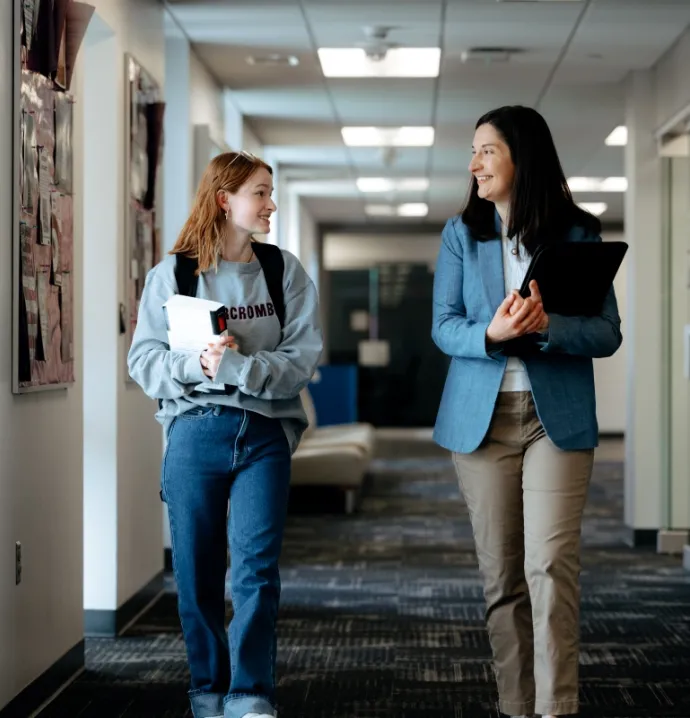UNI part of $13.9 million grant to fight climate change
UNI part of $13.9 million grant to fight climate change
CEDAR FALLS, Iowa – The University of Northern Iowa is one of four institutions that will combat climate change as part of a $13.9 million grant from the National Science Foundation. The grant funds a program led by the University of Alaska Fairbanks to help multiple communities respond to coastal erosion, flooding, permafrost thaw and other hazards attributed to climate change. The four years of funding, awarded this month, is part of the foundation’s Navigating the New Arctic program.
The funding supports AC³TION, a project led by the Alaska Coastal Cooperative at UAF in collaboration with the rural coastal communities, the University of Northern Iowa, Arizona State University and the University of Texas El Paso. The group’s acronym stands for Alaska Coastal Cooperative for Co-producing Transformative Ideas and Opportunities in the North.
“This award is a culmination of years of hard work and effort by many people at UAF and beyond, including our community and institution partners,” Alaska Coastal Cooperative Director Chris Maio said. “It really is an amazing group of experts that we’ve brought together to contribute toward resilient coastal communities in the Arctic.”
“To effectively respond to a rapidly changing Arctic, this project will develop and implement an innovative approach to resilience action that identifies community priorities, advances applied convergence science and improves communication and synergy across multiple stakeholder groups,” Maio said.
As a primary project partner, UNI will be engaged in the following project’s tasks:
- Identify community priorities for projecting coastal hazard risks.
- Identify community needs to adapt infrastructure, including communication systems.
- Integrate local knowledge with multi-level governance processes to allow for an effective response to a rapidly changing Arctic.
- Develop place-specific models and forecasts of coastal change and community impacts and adaptation options
- Document household-level impacts of multifaceted change on health and wellbeing.
- Increase knowledge exchange among communities and among scientists and community residents through various efforts.
UNI researchers will lead the project efforts in four communities in the Western Alaska and Aleutian Islands.
Professor of geography and director of the Arctic, Remote and Cold Territories Interdisciplinary Center (ARCTICenter) at UNI, Andrey N. Petrov, believes AC³TION is a unique collaborative effort in the Arctic in terms of research scope, geographical scale, transdisciplinary methodology and community capacity building.
“This project is built on partnerships with communities and grounded in the co-production of knowledge with Indigenous knowledge holders across Alaska and beyond,” said Petrov. “Each partner community will be funded to pursue their research priorities pertaining to coastal change and will have community researchers work closely with other members of the AC³TION team to ensure the project’s results are well-attuned to the most urgent needs of Arctic residents. AC³TION also will strengthen direct community-to-community links, which are exceptionally valuable for facilitating knowledge sharing.”
The UNI ARCTICenter’s postdoctoral scholar Victoria Sharakhmatova and affiliate assistant professor Tatiana Degai, both Indigenous scholars, are also involved in the project. A graduate student and undergraduate geography majors will also be involved.
The collaborators worked for more than three years to develop the project’s research questions, objectives and activities. They held in-person meetings with tribal councils and held a workshop at UAF last year.
“This is an amazing opportunity for Western science and Indigenous knowledge bearers to exchange knowledge, create relationships and work toward a healthier future for all the lands, waters and personnel involved,” said Casey Ferguson, the Alaska Coastal Cooperative’s Indigenous community coordinator.
Matthew Balazs, Alaska Coastal Cooperative deputy director, said the relationships among those involved are key.
“The existing relationships and trust that have been built up between the communities and research groups over the years are the cornerstones on which this project was built and are essential components needed for our long-term success,” he said.
“AC³TION embodies the spirit of the Alaska Coastal Cooperative’s mission and goals. While the project will run for four years, our intent is to leverage the successes and lessons learned to ensure the ACC will continue this critical work well into the future.”




